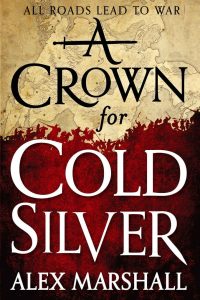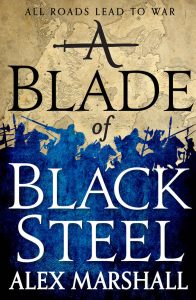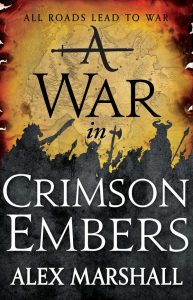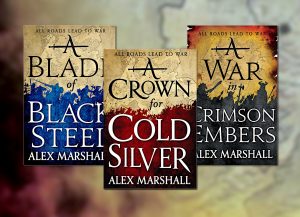THE CRIMSON EMPIRE Trilogy by Alex Marshall (Series Review)
 I’ll be honest, I’m a sucker for Grimdark fantasy. Yes, it’s a bit cliche, but I was hooked in by the master of the subgenre himself, Joe Abercrombie, and fell down the rabbit hole pretty soon after I blitzed my way through The First Law trilogy. I’ve been drawn to authors like R.F Kuang, Sam Sykes and Ed McDonald ever since, all of whom offer opportunities to return to these dark, disturbing, uncomfortable, yet uttering bewitching fantasy worlds.
I’ll be honest, I’m a sucker for Grimdark fantasy. Yes, it’s a bit cliche, but I was hooked in by the master of the subgenre himself, Joe Abercrombie, and fell down the rabbit hole pretty soon after I blitzed my way through The First Law trilogy. I’ve been drawn to authors like R.F Kuang, Sam Sykes and Ed McDonald ever since, all of whom offer opportunities to return to these dark, disturbing, uncomfortable, yet uttering bewitching fantasy worlds.
On my hunt to find the best grimdark had to offer, I happened across the author Alex Marshall and his Crimson Empire trilogy. I had no previous knowledge of Marshall, nor had I heard so much of a whisper about the trilogy, but Google told me this was grimdark, and that was good enough for me.
It’s hard to describe this series in a nutshell, because as with most fantasy epics, it’s full of divergences and sprawling plots that both interweave quite seamlessly and happen entirely autonomously of each other. What I can say broadly, without giving away too much, is that the series follows a select few characters that can often fall anywhere between the role of protagonist and anti-hero, as they face an increasingly present and ever-more terrifying threat, bent on the extermination of all those that stand before it. The plot is a mixture of very human conflict, intertwined with epic battles against gods, demons and prophecy.
The Crimson Empire is, in a word, bonkers. It is disturbing and violent in its hyper-stylised imagery, all while being wickedly funny and bursting with wit. This allows the series to balance on a fine but impressive line that we can cross in seconds, going from a light-hearted, swashbuckling caper to something powerful, epic and really very gripping. The worlds, the monsters, the magic, and the mythos that push this story forward are true examples of what makes the fantasy genre so appealing. They follow the tropes you’d expect while also bending them; they are new yet familiar. Monstrous creatures, powerful wizards, mysterious realms, they all sound generic when you say it like that, but Marshall executes these ideas so well that there is never an ‘eye-roll’ moment. Whether they are driving the story forward or propelling the intense action scenes that litter this series, the tropes work beautifully to keep you along for the ride.
 But, if we’re going to talk about what really propels this trilogy, we have to talk about characters. As this is a review of the Crimson Empire trilogy, and not a singular book within the set, I don’t want to go into too much detail on individual characters, as to avoid any potential spoilers. In brief though, there are a lot of poignant characters in this trilogy, including several POV roles. Each is highly distinctive and engaging, and provides an extra level to the narrative. While some are young, optimistic and out to experience the world, others are hardened, worn-down and comfortable in their own skin. The characterisation really does seem quite effortless in The Crimson Empire, and I felt Marshall understood his creations on a deep level. They are rich in their design, clear in their motives, and they serve their purpose brilliantly.
But, if we’re going to talk about what really propels this trilogy, we have to talk about characters. As this is a review of the Crimson Empire trilogy, and not a singular book within the set, I don’t want to go into too much detail on individual characters, as to avoid any potential spoilers. In brief though, there are a lot of poignant characters in this trilogy, including several POV roles. Each is highly distinctive and engaging, and provides an extra level to the narrative. While some are young, optimistic and out to experience the world, others are hardened, worn-down and comfortable in their own skin. The characterisation really does seem quite effortless in The Crimson Empire, and I felt Marshall understood his creations on a deep level. They are rich in their design, clear in their motives, and they serve their purpose brilliantly.
Perhaps the strongest and most unique aspect of the series, however, is its approach to sexuality. The rise of feminism and the LGBT+ community in the fantasy genre is obviously something we’re all keen to see, and we’ve seen more and more novels defy conventions with the portrayal of their characters. But, none I’ve read do it quite like The Crimson Empire. The series has strong female leads, homosexual and bisexual relationships, polyamorous relationships, and transgender characters. But that’s not exactly groundbreaking in modern-day fiction. What is quite groundbreaking though, is the way Marshall absolutely shatters all barriers of gender and sexuality. The only way to really describe it properly is to say that barriers in this trilogy just do not exist, period. You have men with breasts, women with moustaches, masculine women when bulging muscles and dainty men with very effeminate characteristics, and it’s just not a thing. It’s not a thing for the reader, it’s not a thing for the characters in the story, it’s just how the world is. People are just how they are, nothing is ever black or white, nothing is ever discussed or pointed out as being abnormal or unacceptable. Anyone can be anything at any moment. You never know if the male character you are following is going to start flirting with a woman, flirting with a man, or just flat-out reveal they have female genitals. It’s kind of jarring in a very liberating way. It’s not like anything I’ve read before. It’s unapologetic in its portrayal of sexualization without ever really admitting it’s doing it.
 It’s kind of a beautiful thing. People in this world aren’t defined by anything other than their personality and actions. It must have been deliberate, but at the same time it doesn’t feel like it was. Marshall is so blasé about it all, so seemingly oblivious to how freely he’s breaking down those barriers, it’s hard to tell if it was willful defiance or just whimsical creativity. It’s kind of like when a child tells a story, or paints a picture. They’ve got no preconceptions of how things should be or how they are meant to be. They just, do.
It’s kind of a beautiful thing. People in this world aren’t defined by anything other than their personality and actions. It must have been deliberate, but at the same time it doesn’t feel like it was. Marshall is so blasé about it all, so seemingly oblivious to how freely he’s breaking down those barriers, it’s hard to tell if it was willful defiance or just whimsical creativity. It’s kind of like when a child tells a story, or paints a picture. They’ve got no preconceptions of how things should be or how they are meant to be. They just, do.
If I had to criticise anything about this series, I would have to highlight the third book as perhaps being weaker than the first two. It’s all a bit of a rollercoaster ride, twisting and turning at pace, until you reach the finale and things start to really slow down. A bit too much unnecessary world-building, and a little bit too much padding to get that word count up. It’s not entirely glaring and it doesn’t ruin your enjoyment of the story, but it definitely could have done with maybe being toned down a little bit to just keep up the quality, which for the majority of the series is very high.
I can recommend this grimdark series to any fan of dark fantasy. It’s not gothic or horror fantasy by any stretch, but it’s certainly full of adult themes, dark topics and bleak visions of a world falling apart.

